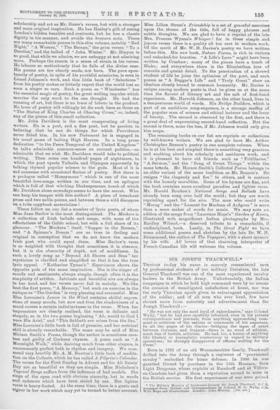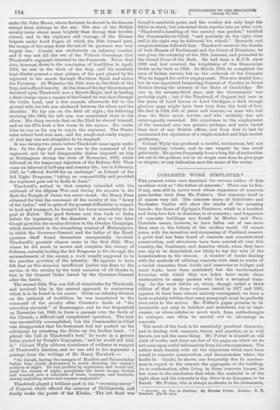SIR JOSEPH THACKWELL.* THOUGH to-day his name is scarcely remembered
save by professional students of our military literature; the late General Thackwell was one of the most experienced cavalry leaders in the British Army. Unfortunately, the Indian campaigns in which he held high command were by no means the occasion of unmitigated satisfaction at home, nor was the early Victorian epoch given to extravagant appreciation of the soldier; and of all men who ever lived, few have shrunk more front notoriety and advertisement than Sir Joseph Thackwell:—
"He was not only the most loyal of subordinates," says Colonel Wylly, " but ho had ever carefully refrliiand, oven in his private correspondence and journals, from anything approaching corn-. ment or criticism of the actions or commands of his superiors. In all the pages of his diaries—bridging the lapse of years between Corunua and Gnjerat—thero is no word of adverse, much loss of hostile, criticism. He had, too, a horror of anything like literary or journalistic controversy in regard to military operations; he strongly disapproved of officers writing for the Press."
Born in 1781 of an old Worcestershire family, Thack well drifted into the Army through a regiment of "provisional
cavalry" embodied for home defence; In 1800 he was gazetted Cornet by purchase in the llith Hussars, then Light Dragoons, whose exploits at .Einsdorff and at Villers- en-Cauchiea had given them a reputation second to none in the British service. His first •experiences of war were gained
• •
*. The Military Memoirs of Licuronant.General Si,' Joseph Thnektren, Arranged' from Diaries mud corrospomtence by Colonel H. t.. Wylly, With Maps and Illustrations. London John Murray. [15s. not.a
under Sir John Moore, whose fortunes he shared in the famous retreat from Astorga to the sea. The star of the British cavalry never shone more brightly than during that terrible retreat, and to the vigilance and courage of the Hussar brigade under Lord Paget, of which the 15th formed part, the escape of the army from the net of its pursuers was very largely due. Comae was exclusively an infantry combat, and it was not till the eve of the Vittoria Campaign that Thackwell's regiment returned to the Peninsula. From that date, however, down to the conclusion of hostilities in April, 1814, he was in the thick of the fray, and' his carefully kept diaries present a clear picture of the part played by his regiment in the march through Northern Spain and across the Pyrenees. At Waterloo the 15th were in the thick of the fray, and suffered heavily. At the close of the day the command devolved upon Thackwell, now a Brevet-Major, and in leading a final charge upon a square of the Guard be was shot through the bridle hand, and a few seconds afterwards fell to the ground with his left arm shattered between the elbow and the shoulder. He lay out on the field all night ; the following morning (the 19th) his left arm was amputated close to the elbow. His diary records that on the 22nd be shaved himself, and on the 27th took a few turns in the square. Six weeks later he was on his way to rejoin the regiment. The Penin- sular school bred iron men, and the rough-and-ready surgery of that day was not altogether to be despised.
It was twenty-two years before Thackwell came again under fire. In the days of peace he rose to the command of his regiment, and he had disagreeable duties imposed on him at Nottingham during the riots of November, 1831, which followed on the temporary rejection of the Reform Bill. Then came an interval of half-pay and country life; but in February, 1837, he "offered £4,000 for an exchange" as Colonel of the 3rd Light Dragoons, "taking no responsibility and provided the regiment goes out to India in June."
Thackwell's arrival in that country coincided with the outbreak of the Afghan War, and during his sojourn in the East the Temple of Janus was never closed. Sir Henry Pane 'obtained for him the command of the cavalry of the "Army of the Indus," and in spite of the greatest difficulties in respect
to food and transport, he brought his force successfully to its 'goal at Kabul. His good fortune sent him back to India before the beginning of the disasters. A year or two later Gough gave him the cavalry division in the G-walior Campaign, which terminated in the scrambling combat of Maharaj poor, in which the Governor-General and the ladies of the Head- quarters Staff found themselves unexpectedly involved. Thackwell's greatest chance came in the first Sikh War, where he did much to secure and complete the victory of :Sobraon, actually leading the 3rd Dragoons in file through the
entrenchments, of the enemy, a work usually supposed to be the peculiar province of the infantry. He appears to have • felt that on this occasion insufficient justice was done to the -service of the cavalry by the total omission of all thanks to him in the General Order issued by the Governor-General after the battle.
The second Sikh War was full of vicissitudes for Thackavell,
and involved him in the nearest approach to controversy which is to be found in his career. Given an infantry division on the outbreak of hostilities, he was transferred to the command of the cavalry after Cureton's death at "the schoolboy skirmish" of Ramnuggar, and he was despatched on December 1st, 1848, to force a passage over the fords of the Chenab, a difficult and complicated operation. The task was successfully accomplished, but the Commander-in-Chief wits disappointed that his lieutenant had not pushed on the advantage by attacking the Sikhs .on the further bank. "I placed the ball at Thackwell's feet," he wrote in a private letter quoted by Gough's biographer, "and be would not kick it," Colonel Wylly adduces abundance of evidence in support of Thackwell's inaction, and we can -add to his argument a passage' from the writings of Sir Henry Havelock :—
" Sir Joseph, having the example of Moodkee and Forozeshahar before him, wisely determined to avoid storming the enemy's • position at night. He had profited by experience, and would not, ,amid the shades of night, precipitate his brave troops, broken ,and wearied, into a labyrinth of tents, waggons, and tumbrils, ,among exploding mines and expense magazines."
Blackwell played a brilliant part in the "crowning mercy" of Gujerat, which effaced the memory of Chillianwala, and ;finally broke the poWer of the Khalsa. The left flank was Gough's assailable point, and the cavalry not only kept the Sikhs in check, but converted their repulse into an utter rout. "Thackwell's handling of the cavalry was perfect," testified the Commander-in-Chief, "and precisely at the right time and in the right way he delivered his attack." Rewards and congratulations followed fast. Thackwell received the thanks of both Houses of Parliament and the Court of Directors ; he was given the colonelcy of the 16th Lancers, and promoted to the Grand Cross of the Bath. He had been a K.C.B. since 1839, and had received the knightship of the Hanoverian Order as far back as 1834. In March, 1853, he completed his term of Indian service, but on the outbreak of the Crimean War he begged for active employment. This was denied him ; but he was appointed Inspecting-General of Cavalry in Great Britain during the absence of the Duke of Cambridge. He was in his seventy-third year, and the Government was probably right ; but if the Thaekwell of Gujerat had been in the place of Lord Lucan or Lord Cardigan, a dark though glorious page might have been torn from the book of fate. He died in 1859, full of years and honour,—a man who had done the State much service, and who certainly was not extravagantly rewarded. His experience in the employment of the mounted arm was greater, perhaps, and more varied than that of any British officer, and from first to last he maintained the reputation of a single-minded and high-souled gentleman.
Colonel Wylly has produced a careful, meritorious, but not very inspiring volume, and in one respect he has erred grievously. He quotes frequently from a long list of authorities set out in the preface, but in no single case does he give page or chapter, or any indication save the name of the writer.

























































 Previous page
Previous page